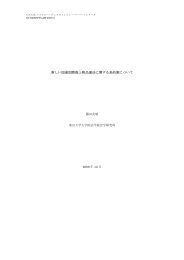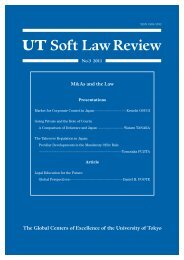UT Soft Law Review
UT Soft Law Review
UT Soft Law Review
Create successful ePaper yourself
Turn your PDF publications into a flip-book with our unique Google optimized e-Paper software.
<strong>UT</strong> <strong>Soft</strong> <strong>Law</strong> <strong>Review</strong> No.2 2010shareholders of the opportunities of selling their shares to the acquirers after adequatetime and information necessary for them to appropriately decide whether to support oroppose the takeovers or the opportunities for negotiation are ensured. Therefore itcould prevent the formation of an efficient capital market. Thus, cash or other financialbenefits should not be granted to the acquirers.Furthermore, the granting of cash or other financial benefits might harm the interestsof the shareholders of the target company because it would involve transfer of funds tothe acquirer that would have been paid out to shareholders in the form of dividends orthat would have, through being directed toward investments, contributed to theshareholder interests of the target company.To begin with, takeover defense measures should not be implemented unless thedirectors of the target companies can responsibly explain that they are able toimplement such measures without granting cash or other financial benefits since thetakeovers would be detrimental to the shareholder interests.(2) The argument that takeover defense measures are always justified in so far as they areapproved by a majority of shareholders in the general meeting of shareholders, eventhough directors avoid making a decision on their own and pass on the decision to theformality of the general meeting of shareholders, might send the erroneous message torelated parties that firm defense system can be established with the shareholderstructure which would guarantee the approval of a resolution of the general meeting ofshareholders. 5It can even be argued that it would be evasion of responsibility if directors of the targetcompany, who are obliged to carry out the duty of care for the company, avoid makinga initial judgment on whether the takeover proposal is in the shareholder interests andjustify themselves by passing on the decision of supporting or opposing the takeover tothe formality of the general meeting of shareholders.Hence, the directors of the target company must behave with responsibility anddiscipline in the face of takeovers.These situations might invoke uses of takeover defense measures for the purpose ofmanagerial entrenchment or not for the original objective of protecting the shareholderinterests. To restrain the possibility of such misguided uses, it will be necessary at the presentother financialbenefits would strengthen the legality of takeover defense measures.5 In the Supreme Court’s decision on the Bull-Dog Sauce Co., Ltd. case (Supreme Court decision of August7, 2007), the court ruled that “when the gratis issue of stockacquisition rights to shareholders withdifferential terms is not for the purpose ofmaintaining corporate value and the interests of shareholders asa whole but mainly forthe purpose of maintaining the control of directors managing the company orcertainshareholders supporting such directors, such gratis issue of stock acquisition rightsshould inprinciple be understood as being issued according to an grossly unfair method.The understanding that firmdefense system can be established with the shareholderstructure that would ensure formally passing aresolution of the general meeting ofshareholders is inconsistent with these rulings in the judicial decision.93





